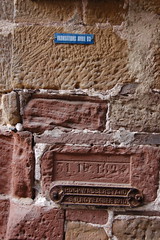Jack Goldsmith, The Terror Presidency
Lessig's blog entry about Jack Goldsmith's "Terror Presidency" made me curious enough to get and read the book.
Goldsmith - a staunch conservative, who ultimately believes that most of the things that the Bush government actually does are right and appropriate - was propelled from academia first into the Pentagon, then to heading the Office of Legal Counsel, a position in which he was effectively the chief legal arbiter of what the executive branch is allowed to do by law, and what it isn't. There, he found himself revoking a set of legal opinions (the torture memos) that asserted quasi-absolute presidential power, in order to authorize practices that Goldsmith believes were appropriate under applicable law. This revocation put him at the center of a struggle within the Bush administration, where the fear of the next attack meets arrogance and a desire to not consult.
The book, then, has two main threads of discussion: On the one hand, the mentality and working environment within the Bush government; on the other, the comparison of Bush's political strategy with Roosevelt's during World War II: In Goldsmith's view, Roosevelt, like Bush, had to step to the edges of what was legal, and sometimes beyond. But where Bush's asserted presidential authority is often based on shoddy legal reasoning, Roosevelt's authority was based on building broad political and public support for his actions. Where Roosevelt strengthened the presidency by building authority, not asserting it, Bush weakens it, by asserting authority, and deliberately not building broad support.
Overall, an illuminating (though chilly) read, in particular to this reader who is neither American, nor a lawyer.


